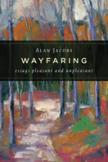On the Pilgrim Path
Alan Jacobs has passed the quarter-century mark as a professor of English at Wheaton College in Illinois. Though not to be confused with A. J. Jacobs, the author of The Year of Living Biblically, this Jacobs has lived many years as both an academic and an evangelical Christian and lists “hermeneutics and Christian theology and literature” among his interests. Having written more than a half-dozen books on topics ranging from C. S. Lewis and W. H. Auden to original sin, he has collected a bundle of essays and reviews covering the range of these interests, and then some, in Wayfaring: Essays Pleasant and Unpleasant.
Reading these essays, it’s hard to be sure which ones Jacobs considers “unpleasant.” Surely no one would deliberately select unpleasant writings if the word is a judgment on the writing itself. And though he suggests that “some are celebratory, some are critical,” the former predominate because Jacobs is an inveterate celebrator. Sometimes the laudatory adjectives get a little wearing, particularly when they rise to the superlative. Virginia Woolf’s “A Room of One’s Own” is “that greatest of English essays,” but Montaigne’s “Of Repentance” is “the finest essay ever written.” And this only four pages into his introduction.
Jacobs’s criticism is reserved not for bad prose, but for bad theology, by which he usually means the over-simplified, feel-good sort that can be found in some contemporary evangelicals, as well as in Kahlil Gibran, whom he parodies in a review of the Collected Works: “Expansive and yet vacuous is the prose of Kahlil Gibran/ And weary grows the mind doomed to read it.”
But his enthusiasms far outweigh his irritations. He loves the classical tradition, from Horace to Virgil, and its British successors both Miltonic and Swiftian. But he particularly delights in Anglo-Christian 20th-century writers: C. S. Lewis, J. R. R. Tolkien, G. K. Chesterton, T. S. Eliot, W. H. Auden and, on the secular fringe, J. K. Rowling. (As Calvin Trillin once said in another context, can’t any of these people afford a first name?) Wheaton College is the repository of many of these writers’ papers, including Lewis’s personal library.
There are separate essays on three of these authors—Auden, Tolkien and Rowling—and all appear regularly in the other essays, except those with highly specialized subjects, such as English landscape gardening, church billboards or American evangelical practice.
As these essays suggest, Jacobs is an epigone, a follower-after, and the greater giant in whose shadow he writes, the better his own work. Writing on Samuel Johnson and the Oxford English Dictionary, for example, he has much to say on “dictionary-reading as a school for virtue” and on the general merit of one-author dictionaries over committee products (though he praises the O.E.D. as the “great outlier,” a committee work that is “the world’s largest linguistic rummage sale”). His essay “The End of Friendship,” probably the most enduring piece in the collection, not only treats Lewis and Tolkien’s bond and its withering, but extensively explores the epistles of Horace to Maecenas, of which Jacobs says, “taken all together they form as lovely and vivid a picture of friendship as we have, and as we are likely to get.”
The implication, of course, is that Tolkien, Rowling and the rest are in their own way giants. Jacobs certainly makes the case for them. While conceding that The Lord of the Rings “is notably deficient” in some literary virtues, he suggests that it has a special place among “much-loved books [that] lie permanently beyond the reach of academic critique.” With an assist from G. K. Chesterton’s defense of an earlier genre, Jacobs calls the Potter series “the greatest series of penny dreadfuls ever written” and asserts that “they can be, if we read them rightly, both a delight in themselves and a school for our own imaginings.” And in an essay titled “The Brightest Heaven of Invention,” he offers even higher praise for Tolkien’s creativity, arguing that “the pattern and motto of inventio is, surely, the first chapter of the book of Genesis.”
Tolkien himself might have eschewed such praise, though in the essay “On Fairy-Stories” he made much the same point. After all, as Jacobs notes, Tolkien once said of his trilogy, “If you like it you do,/ If you don’t, then you boo.” Jacobs too is becomingly modest. In the essay “Sentences,” he says “I may not be much of a writer, but I do like sentences; indeed I love them, and think about them a lot—shockingly often, really.”
Reading the writers he loves over Jacobs’s shoulder makes for a companionable conversation, the kind his favorites might have shared over port or porter.
This article also appeared in print, under the headline “On the Pilgrim Path,” in the September 13, 2010, issue.








